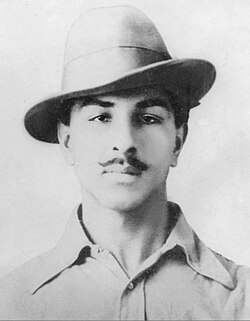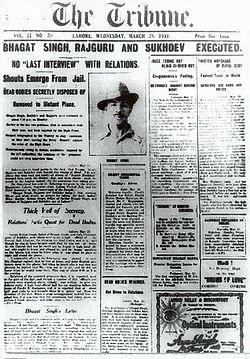| 23 March 1931: Shaheed | |
|---|---|
 DVD cover | |
| Directed by | Guddu Dhanoa |
| Screenplay by | Sultanu Gupta |
| Dialogues by | Sanjay Masoomm |
| Story by | Sultanu Gupta |
| Produced by | Dharmendra |
| Starring | Bobby Deol Sunny Deol Amrita Singh Rahul Dev Vicky Ahuja Suresh Oberoi Shakti Kapoor Divya Dutta Aishwarya Rai |
| Cinematography | Tirru |
| Edited by | Keshav Naidu |
| Music by | Songs: Anand Raaj Anand Score: Surinder Sodhi |
Production company | |
Release date |
|
Running time | 185 minutes |
| Country | India |
| Language | Hindi |
| Budget | ₹20 crore [1] |
| Box office | ₹14.25 crore [2] |
23rd March 1931: Shaheed is a 2002 Indian Hindi-language biographical historical drama based on the life of Indian revolutionary Bhagat Singh directed by Guddu Dhanoa. It depicts the events leading up to the hanging of Singh and his companions Shivaram Rajguru and Sukhdev Thapar on 23 March 1931. The film stars Bobby Deol as Bhagat Singh, his elder brother Sunny Deol as Chandra Shekhar Azad, Amrita Singh as Vidyavati Kaur Sandhu (Bhagat's mother) and Aishwarya Rai as Mannewali (special appearance), along with Rahul Dev, Vicky Ahuja, Vivek Shauq and Raja Bundela.
Contents
The film's release coincided with another film based on Bhagat Singh directed by Rajkumar Santoshi titled The Legend of Bhagat Singh . Both films failed at the box office. [3] [4]




